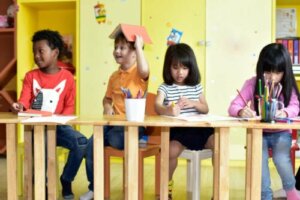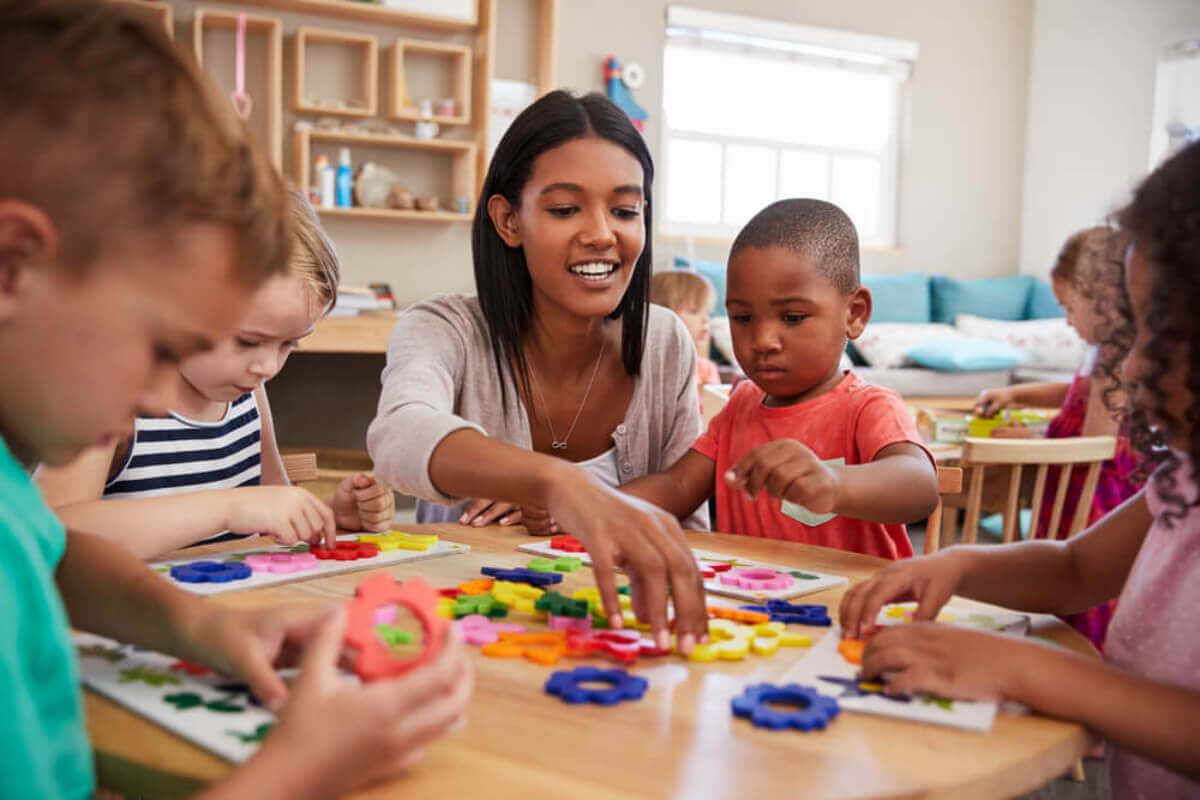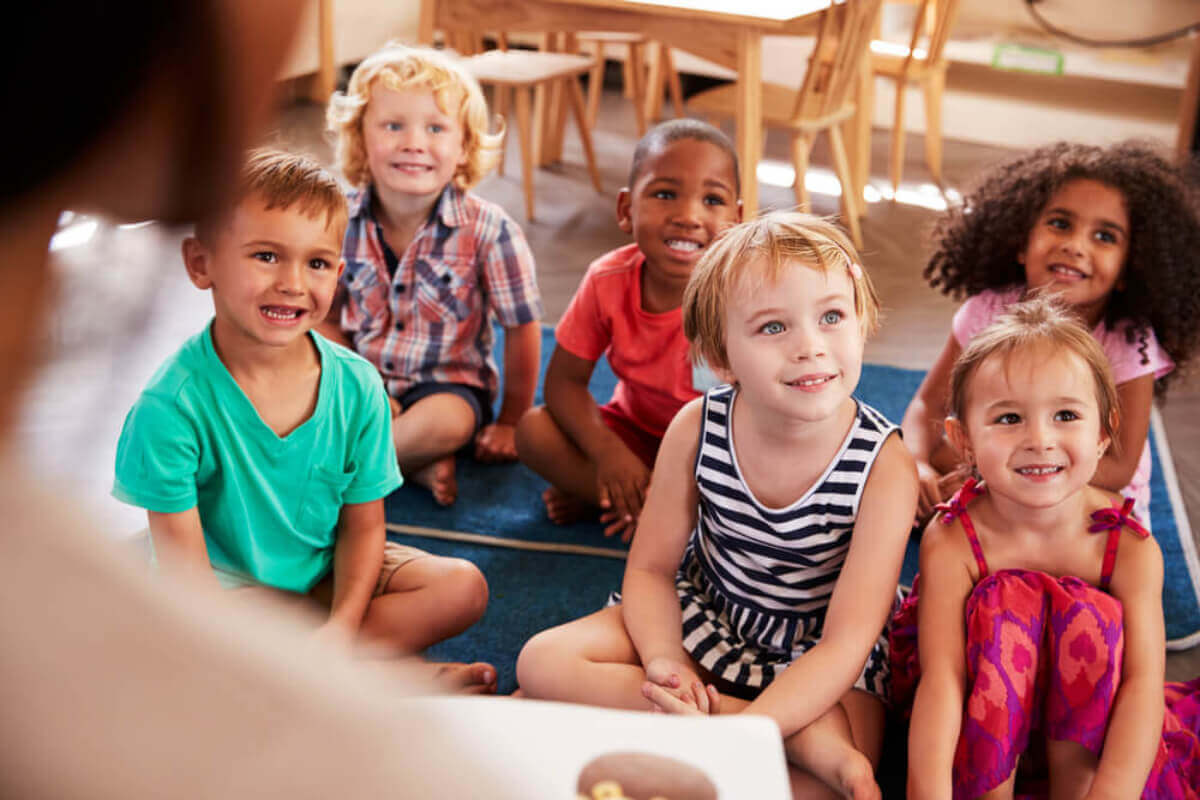How to Prepare Your Children for Preschool


Written and verified by the psychologist Mara Amor López
Entering preschool is a challenge for any child. A new stage begins and parents are afraid that their little one may have a hard time adapting to a new school. In fact, this is even the case for the parents of children who’ve already attended daycare. With this in mind, here are some ideas to prepare children to enter preschool.
All children need a period of adjustment to this new stage in their education. Though it may be difficult at first, sooner than you might expect, they’ll manage to adapt completely. Even so, parents can initiate activities with them that will better prepare them for this new adventure they’re about to begin.
The most important thing is that your children view everything you do as a fun activity and not a boring lesson. So, do you want to know what you can do to prepare your children for preschool? Keep reading to find out!
Activities or ideas to prepare children for preschool
Some of these ideas come from early childhood teachers and the U.S. Department of Education’s “Learning Partners” program. All of them can help you prepare your child for entry into preschool.

These activities prepare your child to listen, follow directions, and work as a team. These are the three most important goals in early childhood programs. Below, we’ll look at each one of them.
Read a story to your child every day as part of their daily routine
In many preschool classes, the teacher sets aside a short period of time, 10–15 minutes, to read a story to the children (it may be a story about the beginning of school). If you encourage this same routine at home, your child will find it very easy to follow the class and stay in place while listening carefully to what the teacher is reading or saying.
Reading aloud encourages children to listen, as they haven’t learned to read in preschool yet. The more familiar they are with reading, the easier it will be for them to read in the future.
Reading aloud to little ones is a great way to develop reading comprehension from an early age. So, when you read a story to your child, you can ask them questions about what they’ve heard. When children really like a story, they’ll ask you to read it to them over and over again. As a result, there may come a time when they know it so well that they can practically recite it by heart.
Practice listening and following directions
In preschool, children sit at their tables and teachers ask them to be quiet and listen. One activity you can do with your little one is to ask them to sit quietly and listen to everything around them. Then, ask them to describe everything they hear. For example, mommy cooking, a bird singing, the voices on TV, the wind moving the blinds, etc.
It’s not only important for young children to listen, but also to follow instructions that require more than one step. That’s because it’s one of the things they’ll have to do in class. So, you can give them guidelines for different tasks around the house. For example, picking up toys from the living room and taking them to their room. Or, going to wash their hands in the bathroom before helping set the table.
You can also play guessing games like “I spy” when you go for a walk. Here, each player has to wait their turn to ask each other what they see. In each turn, you give each other clues about what you’re looking at. At the same time, the other person has to ask questions to find out what the object or action is.
Have a farewell goodbye ritual for entering school
For many children, daycare is the first time that little ones have to spend time away from their parents. Therefore, they may be afraid you won’t come back or you won’t know how to pick them up, causing them to become nervous. Therefore, to prepare children for preschool, it’s good to establish a goodbye routine. That way, it’ll be easier for them to separate from you before going in.

When you drop your child off at the preschool door, give them a kiss and a hug, a handshake, or sing a song… Anything that comes to mind to ease the tension. This way, they’ll associate this moment with staying in school for a while, and understand that mom or dad will come back for them.
Carry out social activities to prepare children for preschool
When children enter preschool, they must know how to behave and get along with other children. Perhaps your child has gone to daycare or has cousins to play with. This will make it easier for them to relate to other children. However, if your little one hasn’t been to daycare or had contact with any children, it’s important to prepare activities where they can interact with others.
It’s a good option to go to a park, sign them up for dance classes, swimming, etc. In short, any activity that they enjoy and that helps them relate to their peers. In preschool, it’s important for little ones to know how to share, take turns, and collaborate with other children.
Talk to your child about what to expect when they start preschool
It’s normal for children to feel nervous when they start preschool, as it’s a new and unfamiliar stage for them. Therefore, it’s important that you don’t say things that create false expectations, either good or bad.
Simply talk to them about what preschool is and answer their questions and concerns if they have any. Explain what kind of activities they’ll do, that they’ll have classmates, where their school is, etc.
In short, as you’ve seen, these are just some ideas or activities that you can use to help prepare your children for preschool. This way, they’ll be less nervous and the transition will be as painless as possible.
Even if it breaks our hearts to be away from our children to start a new phase, you’ll soon see that it’s worth it. So, go for it!
Entering preschool is a challenge for any child. A new stage begins and parents are afraid that their little one may have a hard time adapting to a new school. In fact, this is even the case for the parents of children who’ve already attended daycare. With this in mind, here are some ideas to prepare children to enter preschool.
All children need a period of adjustment to this new stage in their education. Though it may be difficult at first, sooner than you might expect, they’ll manage to adapt completely. Even so, parents can initiate activities with them that will better prepare them for this new adventure they’re about to begin.
The most important thing is that your children view everything you do as a fun activity and not a boring lesson. So, do you want to know what you can do to prepare your children for preschool? Keep reading to find out!
Activities or ideas to prepare children for preschool
Some of these ideas come from early childhood teachers and the U.S. Department of Education’s “Learning Partners” program. All of them can help you prepare your child for entry into preschool.

These activities prepare your child to listen, follow directions, and work as a team. These are the three most important goals in early childhood programs. Below, we’ll look at each one of them.
Read a story to your child every day as part of their daily routine
In many preschool classes, the teacher sets aside a short period of time, 10–15 minutes, to read a story to the children (it may be a story about the beginning of school). If you encourage this same routine at home, your child will find it very easy to follow the class and stay in place while listening carefully to what the teacher is reading or saying.
Reading aloud encourages children to listen, as they haven’t learned to read in preschool yet. The more familiar they are with reading, the easier it will be for them to read in the future.
Reading aloud to little ones is a great way to develop reading comprehension from an early age. So, when you read a story to your child, you can ask them questions about what they’ve heard. When children really like a story, they’ll ask you to read it to them over and over again. As a result, there may come a time when they know it so well that they can practically recite it by heart.
Practice listening and following directions
In preschool, children sit at their tables and teachers ask them to be quiet and listen. One activity you can do with your little one is to ask them to sit quietly and listen to everything around them. Then, ask them to describe everything they hear. For example, mommy cooking, a bird singing, the voices on TV, the wind moving the blinds, etc.
It’s not only important for young children to listen, but also to follow instructions that require more than one step. That’s because it’s one of the things they’ll have to do in class. So, you can give them guidelines for different tasks around the house. For example, picking up toys from the living room and taking them to their room. Or, going to wash their hands in the bathroom before helping set the table.
You can also play guessing games like “I spy” when you go for a walk. Here, each player has to wait their turn to ask each other what they see. In each turn, you give each other clues about what you’re looking at. At the same time, the other person has to ask questions to find out what the object or action is.
Have a farewell goodbye ritual for entering school
For many children, daycare is the first time that little ones have to spend time away from their parents. Therefore, they may be afraid you won’t come back or you won’t know how to pick them up, causing them to become nervous. Therefore, to prepare children for preschool, it’s good to establish a goodbye routine. That way, it’ll be easier for them to separate from you before going in.

When you drop your child off at the preschool door, give them a kiss and a hug, a handshake, or sing a song… Anything that comes to mind to ease the tension. This way, they’ll associate this moment with staying in school for a while, and understand that mom or dad will come back for them.
Carry out social activities to prepare children for preschool
When children enter preschool, they must know how to behave and get along with other children. Perhaps your child has gone to daycare or has cousins to play with. This will make it easier for them to relate to other children. However, if your little one hasn’t been to daycare or had contact with any children, it’s important to prepare activities where they can interact with others.
It’s a good option to go to a park, sign them up for dance classes, swimming, etc. In short, any activity that they enjoy and that helps them relate to their peers. In preschool, it’s important for little ones to know how to share, take turns, and collaborate with other children.
Talk to your child about what to expect when they start preschool
It’s normal for children to feel nervous when they start preschool, as it’s a new and unfamiliar stage for them. Therefore, it’s important that you don’t say things that create false expectations, either good or bad.
Simply talk to them about what preschool is and answer their questions and concerns if they have any. Explain what kind of activities they’ll do, that they’ll have classmates, where their school is, etc.
In short, as you’ve seen, these are just some ideas or activities that you can use to help prepare your children for preschool. This way, they’ll be less nervous and the transition will be as painless as possible.
Even if it breaks our hearts to be away from our children to start a new phase, you’ll soon see that it’s worth it. So, go for it!
All cited sources were thoroughly reviewed by our team to ensure their quality, reliability, currency, and validity. The bibliography of this article was considered reliable and of academic or scientific accuracy.
- Llenas, A. (20018). El monstruo de colores va al cole. Flamboyant
- Denchfield, N. (2015). El pollo Pepe va al colegio. Ediciones SM.
- Gaimanadam, N. (2016). El primer día de escuela de Chu. Océano.
This text is provided for informational purposes only and does not replace consultation with a professional. If in doubt, consult your specialist.








